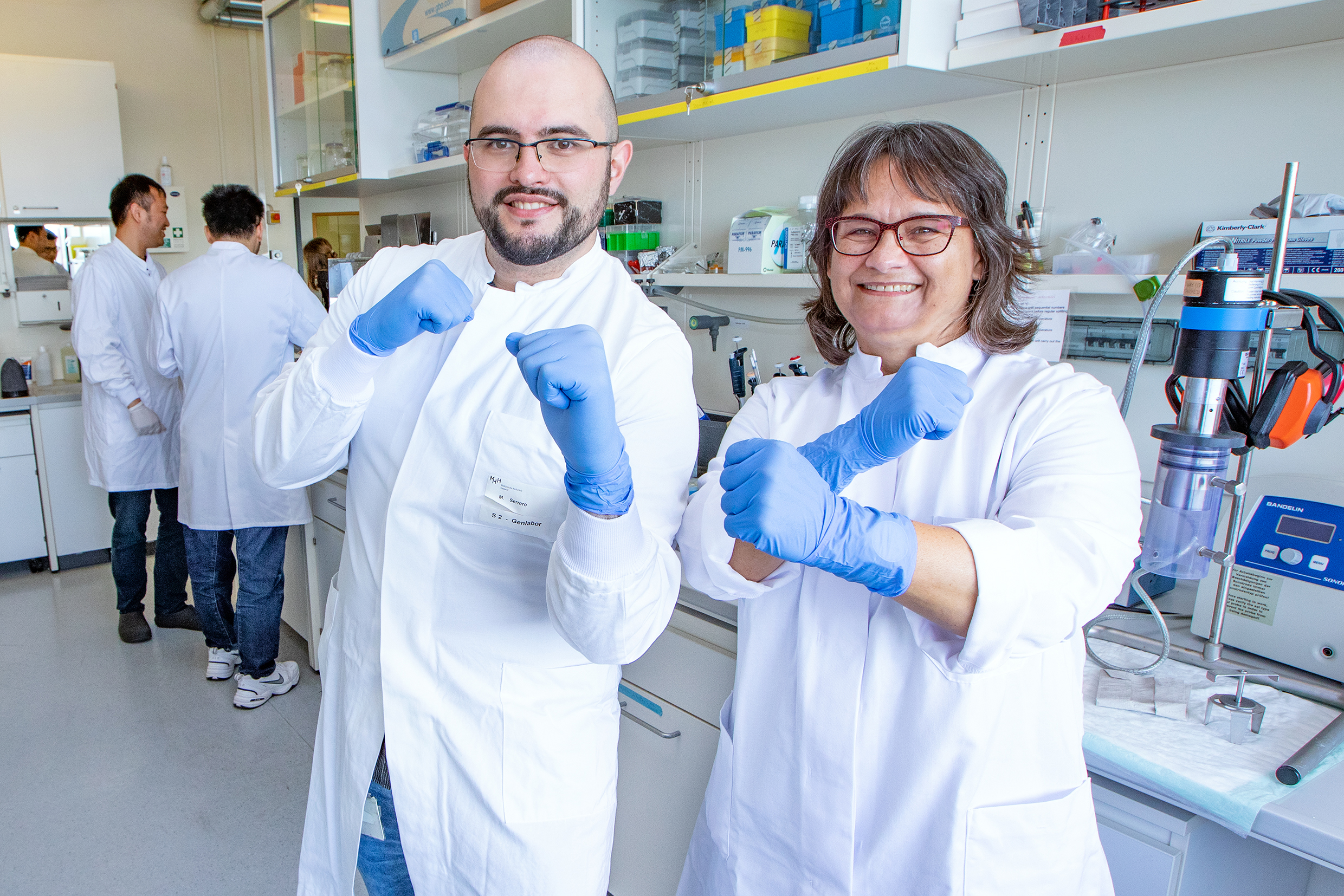Researchers from the MHH and RESIST show how a cell protein of the innate immune response prevents the multiplication of herpes viruses

Professor Sodeik and Dr Manutea Serrero in a laboratory of the Institute of Virology. They show that MxB attacks the capsids of herpes viruses; copyright: MHH/Kaiser.
01.07.2022
Most body cells can defend themselves against viruses after they have been activated by the body's own messenger substances (interferons). This happens with the help of proteins that recognise invading virus components and interfere with virus replication. One of these proteins is the myxovirus resistance protein B (MxB). It can inhibit many viruses, for example HIV and herpes viruses. But until now it was not clear how it does this.
Now a team led by Dr Manutea Serrero and Professor Dr Beate Sodeik from the Institute of Virology at Hannover Medical School (MHH) has researched new findings on the interactions between MxB and herpes viruses as part of a project of the Cluster of Excellence RESIST and published them in the journal eLife. This interdisciplinary team includes researchers from the TU Munich, the University Hospital Freiburg, Princeton University (USA) and the University of Oxford (UK). With their work, the team has possibly made the beginning of a success story on the way to new active substances against herpes viruses.
MxB can destroy the protection of the viruses
"Using biochemical experiments, we were able to show for the first time that MxB has the amazing ability to attack and disassemble the highly stable protective capsids of herpes viruses. The capsids enclose the genome of the viruses and thus protect it from the cell's own defence," says Professor Sodeik. The work was done with herpes simplex viruses, which trigger lip and genital herpes, among other things, and with varicella zoster viruses, which cause chickenpox and shingles. In further studies, the effect of MxB on the capsids of other herpes viruses is now being investigated, for example on the cytomegalovirus and the Epstein-Barr virus.
So far, the team has been working with cell-free methods and with protein mixtures that are formed after the cell membranes are dissolved and that contain active or mutated, inactive MxB proteins. "Now we are investigating whether MxB can also dissect the capsids in intact, infected cells and in which cell types this mechanism is activated by the interferons," explains Professor Sodeik. To this end, the team is developing methods to produce virus particles in which both the capsids and the viral genomes are labelled. MxB-containing cells are then infected with these viruses and investigated at which stages in the infection cycle the cell protein MxB attacks the labelled capsids and whether the labelled genomes are released from the disassembled capsids. "A better molecular understanding of this interferon-induced defence mechanism against herpes viruses can perhaps be used to develop new treatments against herpes viruses that attack capsids," says the researcher.
RESIST – Research for the Weakest
In the Cluster of Excellence RESIST (Resolving Infection Susceptibility), led by the MHH, more than 50 research teams are working on one goal: they want to make it possible for particularly vulnerable people to be better protected against infections, for example newborns. RESIST includes physicians working in the clinic who are very familiar with the situation of patients, as well as basic scientists who research pathogens and their interaction with the immune system down to the smallest detail. RESIST consists of six partner institutions. The spokesperson is Professor Dr Thomas Schulz, head of the MHH Institute of Virology. RESIST is funded by the German Research Foundation (DFG). For more information on the RESIST cluster of excellence, visit the homepage www.RESIST-cluster.de.
SERVICE:
For further information, please contact Professor Dr Beate Sodeik, Sodeik.Beate@mh-hannover.de, telephone (0511) 532-2846.
The original paper "The interferon-inducible GTPase MxB promotes capsid disassembly and genome release of herpesviruses" can be found here.